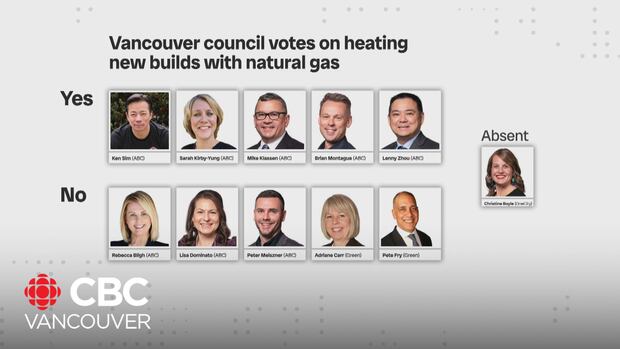Vancouver councillors vote to keep ban on natural gas heating for new homes in city
Proposed changes, backed by Mayor Ken Sim, sparked opposition from many residents and environmentalists

Vancouver city council voted Wednesday against allowing new homes to be heated by natural gas.
The proposed bylaw changes, which were supported by Mayor Ken Sim, would have reversed current climate-friendly practices and drew criticism from many, with more than 140 people registered to speak at council this week.
Dozens also protested in front of city hall ahead of the vote, drumming, chanting and singing in opposition to the proposal.
In the end, the motion was defeated in a 5-5 vote. A motion needs at least a majority of one to pass.
Green Party councillors Adriane Carr and Pete Fry were joined by ABC councillors Peter Meiszner, Lisa Dominato and Rebecca Bligh in voting against removing the ban.
All other ABC councillors voted in favour, along with Sim.
The nays have it - Montague's July amendment -inspired recommendation to re-introduce gas for space and hot water heating in new construction in Vancouver FAILS! <br><br>w/ Bligh, Dominato, Meiszner joining Carr and me in opposition to support climate resilient new construction <a href="https://t.co/BMNNKTAaEb">pic.twitter.com/BMNNKTAaEb</a>
—@PtFrySince 2016, Vancouver has been on a path to gradually phase out natural gas for space and water heating in most new building types by 2025 because using natural gas in this way is the single largest source of carbon pollution in the city, according to materials from City of Vancouver staff.
In July, councillors voted 6-5 in favour of Coun. Brian Montague's motion seeking the change, with Sim casting the tie-breaking vote remotely while on vacation.
Montague argued allowing natural gas for space and water heating would reduce barriers to building middle-income and multiplex housing and make Vancouver more affordable.
That sentiment was supported by some speakers at city hall, including Margareta Dovgal, spokesperson for Resource Works, a non-profit advocacy group for natural resource development.
"I want you to vote for resilience, affordability and a balanced approach that puts people first and restores energy choice," Dovgal said ahead of the vote.
"It's not about halting climate progress, it's about adopting balanced, practical policies that serve all Vancouverites."
Those opposed to the change said it would limit Vancouver's ability to reduce greenhouse gas emissions in order to meet climate goals.
"Our city, in concert with other population centres around the globe, can have a measurable impact on reducing global warming," said Vancouver resident and environmental scientist Laura Mackey.
"I hope that is clear. This vote is an opportunity to commit to sensible, smart emissions reductions policy without sacrificing cost or reliability."
The city is currently not on course to meet its target of reducing carbon pollution by 50 per cent by 2030, according to a report from its general manager of planning.
The vote went ahead without Coun. Christine Boyle, who is on unpaid leave and will officially resign in December after she won a seat in the provincial legislature in October with the B.C. NDP.
No ABC rift, councillor says
ABC Coun. Peter Meiszner, who chaired Wednesday's marathon council meeting, denied there was any conflict within his party over the vote.
"There's no rift in the party," he said. "We disagree sometimes and that's OK. We are a really big team.
"We were elected with an unprecedented majority government and in that team there's diverse viewpoints and backgrounds and lived experiences ... I think that helps us get to better outcomes as a team."
On Wednesday, council also voted to bring small residential buildings to the highest level of B.C.'s Zero Carbon Step Code, but did not commit to that for larger buildings.
The code provides options to reduce the amount of operational carbon emissions from a building by requiring lower emissions from space and water heating systems. It intends to ensure new buildings produce zero emissions by 2030.
With files from Amelia John

